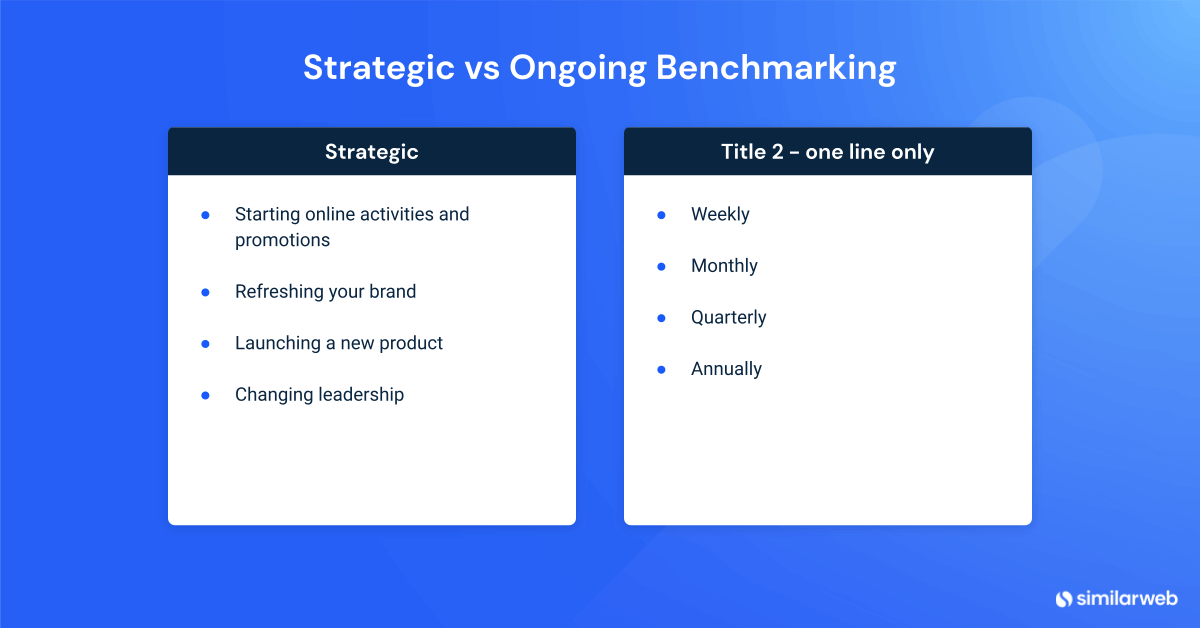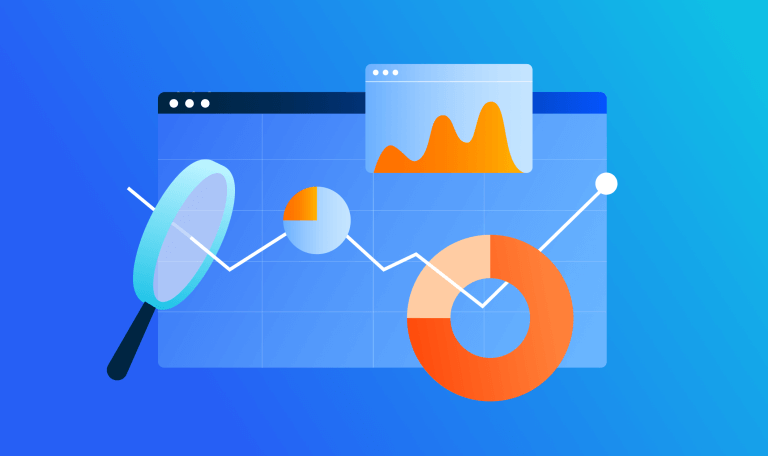The 6 Benchmarking Questions Every Organization Needs to Ask

There’s a lot that goes into benchmarking. You might be working with tons of data, multiple tools, and benchmarking endless activities, all with different purposes. It’s totally normal to feel overwhelmed with the benchmarking process or get so carried away that you’ve lost sight of the bigger picture.
It happens, but you need to make sure you stay on track and keep your eyes on the goal. One pro way to do so is by keeping a list of benchmarking questions to ask whenever you need to refocus.
That’s where we come in. We don’t want to blow our own trumpet, but we have years of benchmarking experience and house a ton of benchmarking data. We consulted our in-house experts and picked the top six benchmarking questions every business should ask.
If you can answer these questions, you’re in a great place with your benchmarking process.
Ready to go? Let’s start.
1. Why am I benchmarking?
Why are you benchmarking? Because everyone else is doing it? Because you heard benchmarking was the secret to business success? If these are your answers, I have some bad news: you’re not maximizing your benchmarking exercise.
Whenever you create a benchmark, you need to start with why you’re doing it.
Refocus on these sub-questions: Are you looking for new opportunities or to improve efficiency? Are you trying to get a better idea of what your competitors are doing and what’s standard in your industry?
Figuring out why you’re benchmarking will help you set goals, determine which type of benchmarking you need, and set the process to obtain your benchmarks.
2. Which departments benefit from benchmarking?
Any part of your business that could be improved can benefit from benchmarking. However, certain teams have the most to gain from it, mainly those that focus on market research, corporate strategy, business intelligence, and consumer insights and audience.
For example, your market research and corporate strategy teams will use benchmarking to analyze the market, determine your market share, and develop different strategies including the ever-important digital strategy.
Your business intelligence team, on the other hand, will benefit from benchmarking engagement metrics to determine your website’s stickiness, competitor insights, and other data to help them analyze performance.
Any team that focuses on customers will benefit from benchmarking target audiences and consumer behavior, which will provide ideas to obtain new customers.
Hone in on not only what you want to achieve from benchmarking, but who it will be relevant for to achieve a higher level of focus.
3. When should I benchmark?
Benchmarking might be a strategic initiative that’s part of a planned change in your company or it may be an ongoing project that you do periodically. Your answer for when to benchmark depends on your answer to “Why am I benchmarking?”
For strategic initiatives, benchmark before transforming digital activities, refreshing your brand, launching a new product, changing your leadership team, or responding to a crisis. In these cases, a benchmark will reveal what’s expected in your industry and will set you up for success.
With ongoing projects, you could benchmark weekly, monthly, quarterly, annually, or in accordance with different campaigns or initiatives. For example, you might benchmark every time you launch a new PPC campaign. Ongoing benchmarking helps you track performance and identify areas for improvement.
4. What should I benchmark?
Let’s go back to the first question. It depends on your goals. Once you know what you’re looking for, you can decide the type of benchmarking you need and what information you’re benchmarking.
Prime example: You’re trying to improve your sales process. You’ll want to benchmark your sales process against your competitors’ processes. You can map their sales process, analyze their marketing channel mix, and calculate their conversion metrics. Comparing your process to theirs will show you where yours needs improvement and will give you ideas of what to change.
Alternatively, maybe you’re benchmarking because you want to improve your website. You’ll benchmark your website metrics and track changes over a period of time. For example, you want to benchmark the bounce rate and conversion rate in your industry. You’ll also want to know whether your own performance has improved over time, meaning you’ll benchmark your metrics at different time periods.
5. Who am I benchmarking against?
You might be benchmarking against your competitors, your company’s prior activities, or between different departments. We sound like a broken record already, but who you benchmark against depends on your answer to that golden first question.
Competitive benchmarking is hugely important for you to understand your industry, your rivals, and market trends. You’ll need to analyze your market to determine which companies to benchmark. Benchmarking industry leaders is a good way to get inspired on how to improve while benchmarking companies with metrics similar to yours might bring opportunities for you to steal market share.
Internal benchmarking is a good way to look inwards and analyze your own performance. You can benchmark different processes, workflows, and activities to see if some are more efficient than others. You can also benchmark different teams to see if one outperforms the other. Internal benchmarking is a great way to motivate employees to improve!
6. What should I do differently to improve?
After the first question, this is definitely the most important. Collecting well-researched data is great, but knowing what to do with it is where you’ll get the most benefits out of your benchmark. Maybe you identified new opportunities while conducting a SWOT analysis as part of your benchmark. Or maybe you found that your procurement process includes bottlenecks. Or maybe, you noticed that a competitor’s bounce rate is much lower than yours. You probably also found streamlined processes that you could implement or marketing practices that explain your competitor’s low bounce rate.
Whatever you learned, you need to apply it. You started with your goals, you figured out your position, and now you can follow the map to guide you to success.
Eyes on the benchmark
Knowing why, when, and what you’re benchmarking, who will benefit, who you’re benchmarking against, and how you can improve, will make sure your benchmarking activities provide the most benefit. We recommend writing these benchmarking questions down somewhere in your office so everyone can see them. Keep your answers in mind during your benchmarking process and you’ll surely find success.
FAQs
What questions should you ask when benchmarking?
Before you start asking questions about your competitors, ask yourself why you’re benchmarking and what you want to find out. Once you have these answers, you should ask yourself who you are benchmarking against (and why) and what are your outcomes.
What are some benchmarking questions examples?
Some examples of the questions you want to answer while benchmarking are: What is the average bounce rate in my industry? What is the average marketing channel mix in my industry? What’s my industry’s average conversion rate? How much has my performance improved? Am I doing better or worse than my competitors?
How do I find the answers to my benchmarking questions?
Accurate data is key for benchmarking. To get external data about your competitors and your industry, you can search for information online or use digital intelligence platforms. Similarweb Benchmarking Tools gather data and answer all the questions you have about your and your competitors’ digital activities.
Benchmark like a boss with fresh competitive data
Contact us to set up a call with a market research specialist










